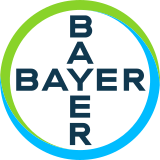 | |
 Headquarters in Leverkusen | |
| Company type | Public |
|---|---|
| |
| Industry | |
| Founded | 1 August 1863[1] |
| Founder | Friedrich Bayer |
| Headquarters | Leverkusen, North Rhine-Westphalia, Germany |
Area served | Worldwide |
Key people |
|
| Products |
|
| Revenue | |
| Total assets | |
| Total equity | |
Number of employees | 101,369 (2022)[2] |
| Website | bayer.com |
Bayer AG (English: /ˈbaɪ.ər/, commonly pronounced /ˈbeɪər/;[3] German: [ˈbaɪɐ]) is a German multinational pharmaceutical and biotechnology company and is one of the largest pharmaceutical companies and biomedical companies in the world. Headquartered in Leverkusen, Bayer's areas of business include: pharmaceuticals, consumer healthcare products, agricultural chemicals, seeds and biotechnology products. The company is a component of the EURO STOXX 50 stock market index.[4]
Bayer was founded in 1863 in Barmen as a partnership between dye salesman Friedrich Bayer (1825–1880) and dyer Friedrich Weskott (1821–1876). The company was established as a dyestuffs producer, but the versatility of aniline chemistry led Bayer to expand its business into other areas. In 1899, Bayer launched the compound acetylsalicylic acid under the trademarked name Aspirin. Aspirin is on the World Health Organization's List of Essential Medicines.[5] In 2021, it was the 34th most commonly prescribed medication in the United States, with more than 17 million prescriptions.[6][7]
In 1904, Bayer received a trademark for the "Bayer Cross" logo, which was subsequently stamped onto each aspirin tablet, creating an iconic product that is still sold by Bayer.[citation needed] Other commonly known products initially commercialized by Bayer include heroin, phenobarbital, polyurethanes, and polycarbonates.[citation needed]
In 1925, Bayer merged with five other German companies to form IG Farben, creating the world's largest chemical and pharmaceutical company. The first sulfonamide and the first systemically active antibacterial drug, forerunner of antibiotics,[8] Prontosil, was developed by a research team led by Gerhard Domagk in 1932 or 1933 at the Bayer Laboratories. Following World War II, the Allied Control Council seized IG Farben's assets[a][9] because of its role in the Nazi war effort and involvement in the Holocaust, including using slave labour from concentration camps and humans for dangerous medical testing, and production of Zyklon B, a chemical used in gas chambers.[10] In 1951, IG Farben was split into its constituent companies, and Bayer was reincorporated as Farbenfabriken Bayer AG. After the war, Bayer re-hired several former Nazis to high-level positions, including convicted Nazi war criminals found guilty at the IG Farben Trial like Fritz ter Meer.[11][12] Bayer played a key role in the Wirtschaftswunder in post-war West Germany, quickly regaining its position as one of the world's largest chemical and pharmaceutical corporations.
In 2016, Bayer merged with the American multinational Monsanto in what was the biggest acquisition by a German company to date.[13] However, owing to the massive financial and reputational blows caused by ongoing litigation concerning Monsanto's herbicide Roundup, the deal is considered one of the worst corporate mergers in history.[13][14][15][16]
Bayer owns the Bundesliga football club Bayer 04 Leverkusen.[17]
- ^ "History of Bayer: 1863–1881". Bayer AG.
- ^ a b c d e f "Bayer AG Annual Report 2022" (PDF). Bayer AG. Retrieved 15 September 2023.
- ^ Kim S (4 September 2014). "Ikea and Other Brand Names You've Been Mispronouncing". ABC News. Archived from the original on 2 October 2022.
- ^ "Euro Stoxx 50, Börse Frankfurt (Frankfurt Stock Exchange)". Deutsche Boerse. Archived from the original on 18 January 2017. Retrieved 17 January 2017.
- ^ World Health Organization (2023). The selection and use of essential medicines 2023: web annex A: World Health Organization model list of essential medicines: 23rd list (2023). Geneva: World Health Organization. hdl:10665/371090. WHO/MHP/HPS/EML/2023.02.
- ^ "The Top 300 of 2021". ClinCalc. Archived from the original on 15 January 2024. Retrieved 14 January 2024.
- ^ "Aspirin - Drug Usage Statistics, US 2013-2021". ClinCalc. Retrieved 14 January 2024.
- ^ "Gerhard Domagk".
- ^ "Law No. 9" (PDF). Allied Control Council. Archived (PDF) from the original on 22 September 2018.
- ^ "Bayer". Holocaust Encyclopedia. Archived from the original on 8 November 2021. Retrieved 8 November 2021.
- ^ "8 Convicted Nazi War Criminals Who Got Off Easy". History Hit. Retrieved 18 August 2024.
- ^ Klawitter N (24 April 2017). "Deutsche Unternehmen haben vom Nationalsozialismus profitiert". Der Spiegel (in German). ISSN 2195-1349. Retrieved 18 August 2024.
- ^ a b Sherman RB (28 August 2019). "How Bayer-Monsanto Became One of the Worst Corporate Deals—in 12 Charts". Wall Street Journal. Retrieved 23 September 2019.
- ^ "Worst deal ever? Bayer's market cap now close to the total cost it paid for Monsanto". FiercePharma. 29 August 2019. Retrieved 23 September 2019.
- ^ Randazzo S (3 February 2021). "Bayer Tries Again to Limit Roundup Liability". The Wall Street Journal. ISSN 0099-9660. Retrieved 4 February 2021.
- ^ Farrell M (6 December 2023). "Years After Monsanto Deal, Bayer's Roundup Bills Keep Piling Up". The New York Times. Retrieved 6 December 2023.
- ^ "The Best Football Team in Germany Is Owned by a Struggling Pharma Giant". Bloomberg.com. 17 May 2024. Retrieved 26 August 2024.
Cite error: There are <ref group=lower-alpha> tags or {{efn}} templates on this page, but the references will not show without a {{reflist|group=lower-alpha}} template or {{notelist}} template (see the help page).